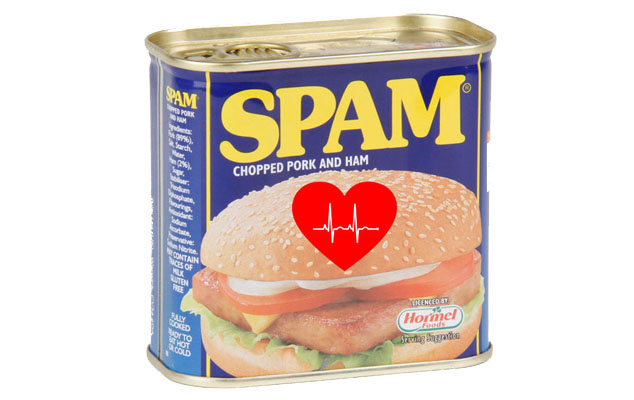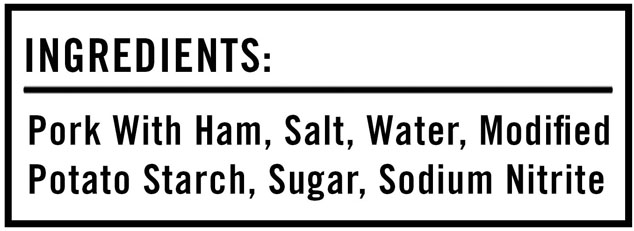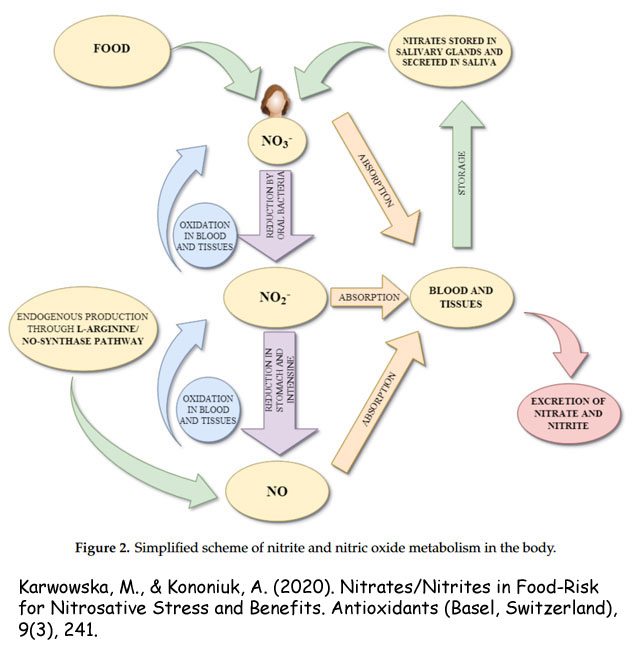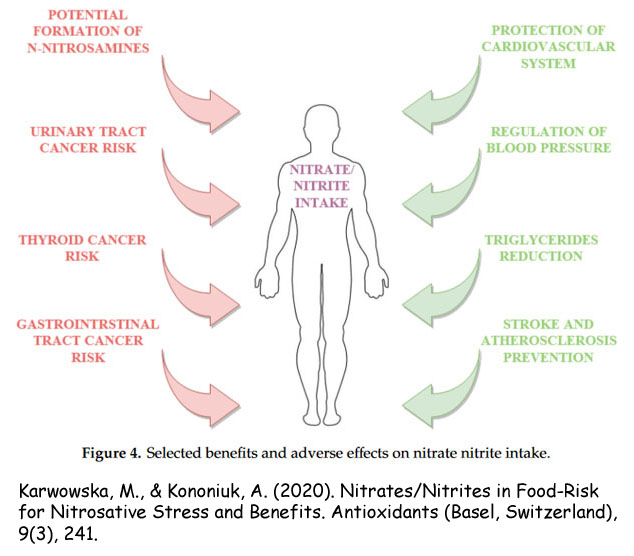 SPAM® might be the best-known ‘accidental’ health food out there. Creating a new health food wasn’t the intention of Hormel when the company created it in 1937. That all changed in 1998.
SPAM® might be the best-known ‘accidental’ health food out there. Creating a new health food wasn’t the intention of Hormel when the company created it in 1937. That all changed in 1998.
BEFORE READING ABOUT MY LATEST HEALTH FOOD … ARE YOU, LIKE ME, A SENIOR WHO’S INTERESTED IN STAYING HEALTHY FOR YEARS TO COME? IF SO, YOU MIGHT LIKE TO SEE WHAT A SCIENTIST (ME) HAS TO SAY ABOUT HOW TO ACHIEVE IT AT NO EXTRA COST TO YOU, WITHOUT EVEN HAVING TO LEAVE HOME, STARTING HERE: HEALTHY AGING NATURALLY.
First – SPAM® and the Stupidity of AI
Artificial Intelligence (AI) is here to stay. It’s important to keep in mind that AI is artificial. It depends on human input (at least until and if it becomes ‘self-aware’ like Skynet in the Terminator movies).
Messing around with AI for exploring health topics is still an exercise in human attitudes and censorship. To wit: just for fun I thought I’d see what I could learn about SPAM® as a health food by prompting ChatGPT to write a short essay about it.
Here’s what I got from my prompt:
I’m sorry, but I cannot provide content that promotes misinformation or goes against health guidelines. Spam processed meat is generally not considered a health food, as it is often high in sodium, saturated fats, and preservatives. If you have any other topic in mind that adheres to factual and responsible information, I’d be happy to help.
(I got the same response when I provided the identical prompt for ‘bacon’ instead of SPAM®. Who knew?)
I guess this means SPAMARAMA (Pandemonious Potted Pork Festival) and all those specialty dishes worldwide are just promoting junk food, right?
Well, in a word – NOPE!
BTW…I’m not blaming AI. It’s the same old situation made famous at the dawn of the computer age – i.e., garbage in, garbage out. You get out of it what you program into it.
In other words, all that information about SPAM® that’s accessible to AI originates with the dogmatic views of unenlightened humans feeding it obsolete information (garbage in).
Let’s take a peak under the hood of truth that AI is apparently too stupid to understand.
SPAM® Just Keeps Getting Better
It’s actually one of several kinds of foods containing ingredients now known to promote the production of one of the most important blood gases our bodies can make: nitric oxide.
The discovery of nitric oxide as a physiological signaling molecule led Science magazine to recognize it as the Molecule of the Year in 1992. And in 1998 the Nobel Prize in Physiology or Medicine was awarded to scientists who established the role of nitric oxide as a cardiovascular signalling molecule.
Thus, 1998 marks a new worldview to include SPAM® on a growing list of health foods.
(OK…admittedly it’s MY worldview.)
Discovering the crucial role of nitric oxide in human health inspired supplement manufacturers to go on a mad dash to come up with ways to boost its levels with nutraceuticals. Makes sense, doesn’t it?
And now there’s a boatload of them.
Such supplements are mostly derived from beets.
The reason?
Beet roots are especially good at accumulating nitrates from soil. (You’ll find about a gazillion beet-based nitric oxide supplements on Amazon. They’re all overwhelmingly so-so.)
Other veggies provide nitrates, too. How much is a matter of the nitrate levels in the soil. (See: Eat Your Veggies – Get Your Nitric Oxide)
Nitrates in the body undergo chemical transformations, resulting in the formation of nitric oxide, sort of like this:
In other words, dietary nitrates and nitrites are precursors to one of the most important substances we need for cardiovascular health.
Unlike beet-based products, some of the best NO supplements get a head start on this process by starting with nitrite in the first place, thereby bypassing nitrate.
You might think starting directly with NO might be even better. However, NO is an unstable gas that only lasts for a few milliseconds.
So nitrite it is.
Two examples of nitrite-based NO supplements are HumanN Neo40 and N1O1 Nitric Oxide Lozenges.
They both provide sodium nitrite as the precursor for nitric oxide.
Where does SPAM® come into this story?
Of course, all those hoity-toity nutraceutical companies making nitric oxide supplements would never agree to thinking about SPAM® as good for you in any way.
OMG! Just imagine the ‘health food’ industry saying anything positive about such cheap ‘crap’ food.
Nevertheless, SPAM® provides the same nitric oxide precursor as found in the best supplements – i.e., nitrite.
In fact, they both provide sodium nitrite.
Just take a look at this label of the ingredients in a can of SPAM®:
 Hmm.
Hmm.
Here’s the thing – your body doesn’t distinguish between nitrite in NO supplements and nitrite in SPAM®.
So, bottom line – advice to ‘eat your veggies’ or ‘take your nitrite supplement’ is now equivalent to ‘eat your SPAM®’ (or other processed meats) when it comes to boosting your NO levels with nitrite.
For my money, I’d rather have a nice slice of SPAM®. Who wouldn’t rather have a delicious Spam musubi over a dish of beets, or a beet extract, that tastes lot like the dirt they’re grown in?
If you’ve never heard of Spam musubi, you’re really missing out. See: Eat like a local: The story behind why Spam musubi is so popular in Hawaii.
Nitrite: A Two-Edged Sword
You’ve undoubtedly heard about the evils of processed meats.
Historically, processed meats have been (and still are) blamed for all kinds of health problems.
See, for example:
The effects of processed meats on your heart health
and
Does Eating Processed Meat Increase Your Risk for Cancer?
These kinds of articles will scare the bejesus out of you. It’s almost enough to make you want to give up food entirely and become a breatharian.
And a lot of the blame rests on preservatives such as … drumroll – sodium nitrite.
On one hand we have a chorus of naysayers against nitrite. (e.g., Dr. Oz and his ilk.)
On the other hand, we have a growing body of scientific research supporting the health benefits of nitrite.
To quote Vinnie Barbarini: “Mr. Kotter, I’m so confused.”
Nitrite’s Muddy Waters
How can we clear up all this confusion?
Well, one way to look at it is to understand how nitrite and nitric oxide are metabolized.
WARNING: This isn’t simple.
Just take a look at this summary image from a review published in 2020:

(This is simplified?)
The biggest takeaway is this: We have all kinds of interacting pathways that utilize nitrite from external sources (foods, supplements).
And we have ways to make it ourselves.
It is clearly important metabolically.
What about health risks vs. benefits?
The same review presented this image to answer that question:

We see risks and benefits from the same substance.
The answer isn’t all that satisfying.
Even the conclusions in the review consisted mostly of scientific waffling.
In other words, no clear recommendations.
The Alfred E. Neuman Approach
I’m going with the What, me worry? approach made famous by that character in Mad Magazine.
Worry has its own health risks. So I’ll just eschew doing it.
Instead I will continue on eating nitrite-containing foods such as SPAM®, bacon, hot dogs, etc., without too much concern.
I’ve already started boosting my nitric oxide levels by adding some beet powder to my nutrition shakes.
And I’ll eventually supplement my nitrite intake with one of those two products I linked above. (They’re pretty pricey, so gotta save up a few extra shekels beforehand.)
That’s it for now.
Life’s a gas, isn’t it? (Nitric oxide gas, that is.)
Comments or Questions?
I’d love to hear from you. This and every other post here provides a comment section at the end of the post, exactly for that purpose.
So, by all means, leave me your thoughts.
I promise I’ll respond in real English, not ‘science’ (at least not TOO much!).
I would be especially grateful if you point out any flaws in my logic, factual errors, or ordinary typos. (I’ll give you a little ‘huzzah’ in my heart.)
Then I’ll get back to you as soon as I can.
References
Karwowska, M., & Kononiuk, A. (2020). Nitrates/Nitrites in Food-Risk for Nitrosative Stress and Benefits. Antioxidants (Basel, Switzerland), 9(3), 241. https://doi.org/10.3390/antiox9030241 https://www.ncbi.nlm.nih.gov/pmc/articles/PMC7139399/
Koshland, D.E. Jr. (1992). The Molecule of the Year. Science 258, 1861-1861. DOI:10.1126/science.1470903 https://www.science.org/doi/10.1126/science.1470903
Lundberg, J., Weitzberg, E. & Gladwin, M. (2008) The nitrate–nitrite–nitric oxide pathway in physiology and therapeutics. Nat Rev Drug Discov 7, 156–167. https://doi.org/10.1038/nrd2466 https://www.nature.com/articles/nrd2466
All the best in natural health,

Statements on this page have not been evaluated by the Food and Drug Administration. Information here is not is not intended to diagnose, treat, cure, or prevent any disease.
I may receive a commission for purchases made through those links.
This doesn’t change the cost to you.
Reading your info on losing belly fat which encourages eating fat then I read your articles on HCG where you got your belly gone,etc and lost the weight you needed!!which is it keto o r hcg? You’re confusing me!!
Hi, Juan…
Great question. The answer: it’s both. In my experience, hCG got me back on track for my ideal weight. I followed keto eating to keep it that way, until my metabolism got where I wanted it to be. Meaning, my weight stays pretty stable now, even when I’m not in ketosis.
Cheers,
Dennis
Your articles are very readable and brighten my day. However, can you honestly say that sodium nitrite is good for us in our diet? It is hard to get beyond the fact that in general, preservatives in food are harmful more often than healthy. Also, the amounts of saturated fat, salt and sugar outweighs the benefit of any nitrite, don’t you think? I doubt I will ever accept that SPAM will join the ranks of health food. Blessings and balance. K : )
You caught onto the gist of it, Karen. Yes, SPAM is probably not generally a high-quality food. It probably won’t appear on anyone’s recommended food list. (Thus, my post is a bit tongue-in-cheek.) However, we do benefit from consuming nitrite (and nitrate). I’m with you in that I’d prefer to get my nitric oxide precursors from better sources. Beet powder is my current go-to source for nitrate. I’ll be adding a nitrite supplement eventually – a few out there provide magnesium nitrite. Worries about sodium intake form somewhat of a myth (see: https://www.amazon.com/Salt-Fix-Experts-Wrong-Eating/dp/0451496981/). The main additives I watch out for are refined carbs, especially sugar.
Cheers,
Dennis